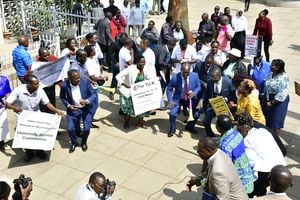Siblings take tale of love and selflessness to streets of Paris

Women’s 1500 TII runner Nancy Chelangat and her guide Geoffrey Rotich train in Paris on August 20, 2024.
The 2020 Tokyo Paralympic Games 1,500 metres T11 bronze medallist, Nancy Chelangat, is determined to rise to the dizzying heights attained by three-time Olympics 1500m champion Faith Kipyegon. On August 10, the visually impaired runner, watching some 80 kilometres away in Compiegne in northern France where Kenya’s Paralympics team is on pre-championship training camp, shouted herself hoarse when Kipyegon won historic third straight Olympics title at Stade de France in Saint Dennis, north of Paris.
It is a dream she hopes to achieve with the help of her elder brother Geoffrey Rotich, who has guided her to some of the best performances of her career in para-athletics.
On that day, Rotich explained every detail to her visually-impaired sister as the race progressed.
“I had followed what had happened to Kipyegon in 5,000m race in which she was disqualified but was later reinstated and kept her silver, medal. The 1,500m is my event and I really prayed for Faith to win her third Olympic title,” she said in an interview yesterday at the team’s training base in Compiegne. Kipyegon won the 1,500m race in yet another Olympic record of 3:51.29, improving her time of 3:53.11 from 2021 Tokyo.
Chelangat, 29, says that Kipyegon’s victory inspires her to win the Paralympics 1,500m TII title after her first two attempts at the 2016 Paralympic Games in Rio de Janeiro, and 2021 edition of the games in Tokyo yielded silver and bronze respectively.
What’s more, she comes from Londiani in Kericho County which is also home to Olympics 5,000m and 10,000m champion Beatrice Chebet, and Olympic 3,000m steeplechase bronze medallist Faith Cherotich.
Kenyan women are yet to win gold in track events in athletics since the country made its debut at the Paralympic Games during the 1972 edition in Hedelberg, Germany.
From a total of 49 medals (19 gold, 16 silver, and 14 bronze) that Kenya has so far won, women contributed 16 medals of two gold, eight silver and six bronze. Kenyan women have been more successful in field events, winning with 10 medals; two gold, four silver and four bronze.
Lucy Wanjiru (javelin 3) from 1980 Paralympics in Arnhem, the Netherlands, and Mary Nakhumicha (javelin THW7) from 1992 Games in Barcelona are the only Kenyan female gold medallists from the Paralympic Games.
In fact, before Henry Wanyoike's exploits in the 5,000m T11 at the 2000 Sydney Paralympic Games, no Kenyan had won any athletics medal from track.
Kenya’s only women medallists from track are Everlyne Khasembula (100m T57-bronze) from 2200 Sydney, Julia Longorkaye (1,500m T12- silver) from 2004 Athens Paralympics, and Nancy Chelangat’s silver (1,500m T11) from 2016 Rio de Janeiro Games, and her bronze from 2021 Tokyo Paralympics.
“I am determined to change that landscape with victory in Paris. I have won silver and bronze but time is ripe for me to win gold,” Chelangat, who was born blind in a family of five girls and two boys on April 16, 1995, says.
Her father Johnstone Koech, a farmer in Londiani, is a former 400m hurdler while her mother, a housewife, used to run 800m races in school.
Despite her rich athletics background, it was hard for Chelangat to convince her parents that she could run competitively in her condition, and it took Rotich’s intervention to convince their father that visually-impaired people can compete.
“That time I was a guide to blind runner Eric Sang, and e had done a couple of races in Kenya. Henry Wanyoike, who had a similar condition was also a well-known figure then. Their stories made my father allow her to compete,” Rotich, who is a father of two, says.
Rotich, 35, recalls that at a young age, her sister couldn’t understand why other children could jump, and play football but she couldn’t. It’s at the age of 10, she understood that she is blind and her that condition was permanent.
“My father was ready to part with anything to have Chelagat regain her eyesight. He even contacted ophthalmologists from the United States, but they assessed her situation and told him that it was impossible,” said Rotich.
Chelangat loved athletics from an early age. She tried javelin and high jump while at Sugutek Primary School for the Blind in Londiani, Kericho County, at the age of 12 before transiting to 100m and 200m races.
“It was an interesting start for Chelangat since she had a guide back in primary school, who had albinism. She could guide her in short races in a tour across the country,” said Rotich. She described her sister as a fast learner, resilient athlete and tireless workhorse.
Chelangat shifted gears to 400m and 1,500m upon completing Standard Eight in 2013, and Rotich would split his time guiding her as well as Sang, whom he had staryted out with in 2008.
In 2015, Rotich parted ways with Sang to fully concentrate on guiding Chelangat. Since then, Chelangat has won two Paralympics medals in 1,500m T11; silver and bronze medals, and two world championships medals - gold and bronze.
“I couldn’t have achieved this without my brother, who has been my second eye and guide, especially after I embraced competitive athletics fully in 2015,” said Chelangat, who also thanked her primary school teacher, Aurelia Kirui, for making a strong case for her in athletics. “It’s tough for a married man with two children to leave his family and business to dedicate his time to me. I really value the support from my brother and his family,” Chelangat said. She is grateful to God that she has never gone through hardships that other disabled people go face.
Born in 1989 in Londiani, Kericho County, Rotich embraced athletics in 2006 while in Form Three at Barshelle Secondary School in Londiani, taking 800m and 400m. He managed to reach the national level but never got to represent Kenya.
Rotich, who is the third born child in their family, is married to Mercy Mutai. He is a father of two - Briden Kipkorir, 3, and Blessing Chepkoech who is six months old.
Chelangat had her maiden for the Grand Prix races in Rabat, Morocco and Tunis, Tunisia, which proved successful as she claimed victories in 400m and 1,500m to see her qualify for the 2016 Rio Paralympic Games.
“I thought I was dreaming in the first place but what followed later in Rio is something that I will always treasure and thank God for,” said Chelangat, who silver medal in the women’s 1,500m T11 in 4:42.12. Jin Zheng from China won in 4:38.92.
Chelangat qualified for the 2017 World Para-Athletics Championships in London but arrived late for the event following a visa hitch.

Deputy head coach para-athletics Abraham Tarbei (right) takes Nancy Chelangat (right) with her guide Geoffrey Rotich and Priscah Jepkemoi (Guide-Kenneth Lagat) during their training at the Compiegne Community Stadium, France on August 12, 2024.
However, she collected a bronze at the 2019 World Para-Athletics Championships held in Dubai, United Arab Emirates as Monica Olivia Rodriguez Saavedra from Mexico, who went for gold, while He Shanshan of China settled for silver.
The performance saw her secure her second appearance at the Paralympics during the delayed 2020 Tokyo Summer Games in 2021. She went on to claim bronze in the 1,500m T11, which was the only medal for Kenya from the Tokyo Games.
Mexican Mónica Olivia Rodríguez won gold, with South African Louzanne Coetzee settling for silver.
The 2023 World Para-Athletics Championships proved a breakthrough for Chelangat, where she won gold in the 1,500m T11 in a new Championship Record of 4:44.15. She beat South Africa’s Louzanne Coetzee to second in 4:44.50 as compatriot Mary Waithera Njoroge settled for bronze in Personal Best 4:50.98.
“There is no championship that I ever prayed to go so hard as in 2021 Tokyo. My event was the last on the calendar where we didn’t have a medal.
"We had won medals since 1972 and I told God let this not be the first event we are missing a medal,” said Chelangat. “I was over the moon. I kicked so hard to the line.
Even as Chelangat finally got the Head of State Commendation (HSC) during the 2023 Mashujaa Day at the Kuprugut Chumo Stadium, Kericho, she wants paralympic medallists treated equally with able-bodied athletes from Olympics and World Athletics Championships.
Chelangat said that the only cash reward she has been given was Sh 750, 000 for the silver medal from 2016 Rio Paralympics.
“I have one more medal from the 2021 Tokyo Paralympics and two medals from world championships…I hope the state will reward me and others who have won medals,” said Chelangat, who also urged the state to build sports facilities that can also be accessed by the disabled.
Chelangat, who focused fully on athletics after completing class eight in 2013, is still single but hopes to get married soon and have children.
Nationality: Kenyan Date of Birth: April 16, 1995 Sport: Para-Athletics Event: 1,500 T11 Disability: Visually Impaired
Paralympics
2016 Rio -1,500m T11 -silver
2020 Tokyo- 1,500m T11-bronze
World Championships
2019 Dubai- 1,500m T11- bronze
2023 Paris- 1,500m T11-gold





